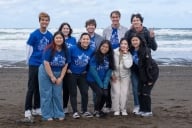You have /5 articles left.
Sign up for a free account or log in.
People in Chicago, Philadelphia, New York and Washington can bond over a common experience this week: They’ve all slogged through 100-degree days in what may turn out to be America’s hottest July on record.
While college facilities managers are busy trying to conserve energy amid skyrocketing air conditioning demand -- the Drexel University College of Medicine told employees to pull the blinds on all south and west facing windows -- and trying to make sure the sprawling green quads don’t turn into sprawling brown quads, climate scientists are riding the heat wave toward greater exposure.
Michael Mann, director of Pennsylvania State University's Earth System Science Center, said that the sweltering summer has come up “again and again” in conversations with friends, other scientists, and the 30 or so journalists who have called him to ask whether the heat should be pegged to global warming.
“You can never attribute any one event to climate change,” Mann said. He uses the analogy of a six-sided die where the three is replaced by a six, so that the die has two sixes. “You’ll see the impact of loading the dice, that six will come up one-third of the time instead of one-sixth of the time,” Mann said. “The same thing is true with specific meteorological events,” he said. No single hurricane or hot spell can be attributed directly to global warming, according to Mann, but “climate change is loading the dice … making those things more common.”
He added that last year’s anomalous hurricane season, combined with this year’s heat wave and the opening of "An Inconvenient Truth," Al Gore’s movie on climate change, have ensured that teachable moments abound for climate scientists.
“I think people sense that something unusual is happening,” Mann said. “It’s understandable. Most people have heard something about [climate change], or perhaps they’ve seen Al Gore’s movie.” Last year, Mann talked about the hurricane season in an atmospheric science class, and in upcoming courses, “I imagine that the unusual heat waves of this summer may be a good example for my students to look at.”
Gavin A. Schmidt, a climate scientist at the NASA Goddard Institute for Space Studies in New York, said that “it’s definitely the case that extreme weather excites media interest and generates a number of calls to people like me for explanations of whether this is or is not related to climate change.” Schmidt said that some people are only interested if the answer is a clear “yes,” but that he does take some of the opportunities to explain the loaded climate dice. Schmidt added that, whether it’s because of Hurricane Katrina, Gore's “An Inconvenient Truth,” or the heat wave, “there are now more openings, and shifts of opinion, for discussion on climate change.”
Schmidt also noted that the close proximity of normally rare events in the last few years has led to “a lot less false 'balancing' ” -- “where some contrarian will be dragged up to argue that whatever it is I say must be wrong,” Schmidt said – in news reports.
Mark Abbott, dean of Oregon State University's College of Oceanic and Atmospheric Sciences, said that Oregon’s heat wave this summer was “a little unusual, but people weren’t dying.” People were dying, however, to the south in California. Abbott said that one of the reasons Oregon communities are getting into the conversation is because residents are wondering whether people, from California and other states, will starting moving en masse to Oregon in search of less extreme weather. Abbott said that a lot of people are already moving from California to Oregon “in search of a dry climate,” and that some cities are wondering if they’ll have enough drinking water in the long term.
Stuart Gaffin, also a Goddard scientist, who is studying urban climate, was on New York Public Radio on Tuesday, and was slated for CBS on Wednesday night. Beyond the extra exposure, the media inquiries have helped Gaffin hone his talking points. Gaffin said he thinks the usual line that “no one can attribute this one event” to climate change is “a bit of a non-starter for the public,” he said. Gaffin prefers to note that a heat wave like the current one “will become part of the statistical record, and when the statistics go up, that’s when we’ll be convinced.”
The heat also gave Gaffin the rare chance to do a little science on television. On Wednesday, CBS filmed him with a college student, a recent high school graduate, and a New York City public school teacher doing a little experiment that could inform some New Yorkers’ style this summer. The group put different colored shirts outside and then measured the temperatures to show that different colors really do absorb the sun’s rays very differently. The white shirt was 98 degrees, yellow was 110, blue was 120, and the black shirt was a scorching 145 degrees. “I think it’s a great way to [reach out to] the public,” Gaffin said, “and it’s somewhat amusing.” And, of course, there was the reporter from the travel magazine who called and asked how hot it would have to be to fry an egg.
Gaffin said he gets similar questions from people in social settings as he does from journalists. “I’ve had some high powered New Yorkers raise [global warming],” he said, “and say ‘that’s not science, that’s politics.’ ” Gaffin added that, when extreme weather events pass, they “recede into the background of people's memories.” But as Gaffin will tell any journalist who comes calling, the statistical record never forgets.








